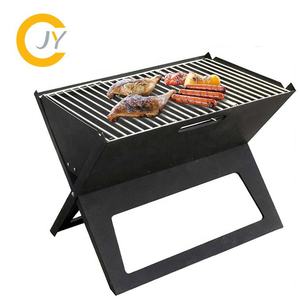In the realm of traditional cooking tools, the gridiron stands as an enduring favorite, prized for its simplicity and effectiveness in outdoor cooking. This essential device, a staple for centuries, allows for grilling food directly over an open flame or heat source, bringing out rich, smoky flavors. In this article, we’ll explore the history, mechanics, and various types of gridirons, illuminating why this tool remains a valued asset in kitchens and outdoor cooking setups alike.
The Historical Roots of the Gridiron
The gridiron's origins trace back to ancient civilizations, where early versions consisted of simple metal frames with rows of bars, ideal for open-fire cooking. Cultures from the Roman Empire to medieval Europe used gridirons to grill food efficiently over direct heat. The term "gridiron" stems from the tool's resemblance to a grid pattern, formed by the parallel metal bars.
Initially crafted from durable, heat-resistant wrought iron, traditional gridirons were typically placed over open fire pits, providing an even cooking surface for meats, vegetables, and more. Although grilling techniques have evolved over time, the fundamental concept of the gridiron endures. Modern versions now range from portable camping grills to large professional setups, adapting the age-old design for today’s grilling needs.
Understanding How a Gridiron Works
Gridirons function by placing food over a direct heat source, such as fire or charcoal, on a metal-bar grid. The gaps between the bars allow for even heat distribution, cooking the food uniformly from all sides. The heated metal bars create grill marks, which not only look appealing but also help to lock in flavor by searing the food's exterior.
Gridirons are typically made from cast iron, stainless steel, or aluminum, each with unique benefits. Cast iron gridirons are prized for their heat retention, ideal for slow-cooking thick cuts of meat. Stainless steel models, by contrast, are lightweight, rust-resistant, and easy to clean, making them popular for everyday grilling.

Types of Gridirons and Their Applications
Various types of gridirons serve different culinary needs, allowing for versatility in outdoor cooking. Here are some popular options:
Traditional Cast Iron Gridiron
This classic choice, known for its durability and heat retention, is perfect for open-flame cooking. Cast iron gridirons excel in cooking steaks, burgers, and fish, providing high temperatures for excellent searing. When seasoned, they develop a natural non-stick surface, enhancing flavor. These gridirons are widely favored for campfire cooking and outdoor grilling.
Stainless Steel Gridiron
Lightweight and rust-resistant, stainless steel gridirons are practical for regular use, especially in outdoor grilling setups or portable grills. Their smooth surface allows for easy cleaning, making them ideal for cooking foods that don’t require intense searing, such as vegetables, poultry, or delicate fish. Stainless steel gridirons are commonly used with modern gas and charcoal grills.
Adjustable Gridirons
Adjustable gridirons offer height control, allowing users to vary the distance between the food and heat source. This feature is advantageous when grilling different types of food at once, giving greater control over the cooking process. Adjustable gridirons are often used in competitive or professional settings where precision is essential.
Portable Gridirons
Designed for convenience, portable gridirons are compact and typically made from lightweight materials like aluminum or stainless steel. They are often foldable, ideal for campers, hikers, and outdoor enthusiasts. Despite their size, these gridirons can achieve the high temperatures required for effective grilling, making them an excellent choice for cooking on the go.

Advantages of Cooking with a Gridiron
Cooking with a gridiron offers numerous advantages, particularly in flavor enhancement, cooking consistency, and versatility.
Enhanced Flavor
One of the main appeals of gridiron cooking is the flavor. The direct heat contact with the metal bars results in the signature grill marks, which contribute to the Maillard reaction, a browning process that locks in moisture and enhances taste. Additionally, cooking over an open flame imparts a smoky, charred flavor that’s hard to replicate with other methods.
Even Heat Distribution
The gridiron's design ensures even cooking, as heat circulates through the spaces between the bars, uniformly heating the food. This prevents overcooking or burning, especially important for thicker cuts of meat where achieving a juicy interior and crisp exterior is essential.
Versatility
A gridiron is highly versatile, accommodating a wide range of foods—from meats to vegetables, seafood, and even fruit. The ability to adjust the height or the heat source allows for both slow-cooking and quick searing, making it a valuable tool for various cooking techniques.
Durability and Longevity
Gridirons, particularly those made from cast iron or stainless steel, are built to last. With proper care, a quality gridiron can endure for decades, making it a worthwhile investment for serious outdoor cooks. Seasoning cast iron gridirons regularly can prevent rust, enhancing their durability and performance over time.
Caring for Your Gridiron
To maintain the longevity and effectiveness of a gridiron, proper care and maintenance are crucial. Here are a few essential tips:
- Seasoning: For cast iron gridirons, seasoning is key. Apply a thin layer of vegetable oil after cleaning, and heat the gridiron to bond the oil to the metal, creating a natural non-stick layer that improves with use.
- Cleaning: Clean your gridiron after each use. For stainless steel gridirons, a wire brush works well to remove food residue. Avoid using harsh chemicals or steel wool, which can damage the surface.
- Storage: Store the gridiron in a dry area to prevent rust. For cast iron models, a light coat of oil before storage provides added protection.

Conclusion
In conclusion, the gridiron is a timeless tool that has enriched cooking techniques for centuries. From the intense flavors and satisfying textures it creates to its durability and versatility, the gridiron remains an indispensable part of both professional and home grilling setups. Investing in a quality gridiron can elevate your outdoor cooking experience, bringing you closer to the rich, flame-kissed flavors that only this traditional method can deliver. Whether you’re a weekend grilling enthusiast or a culinary professional, the gridiron is a valuable addition to your cooking repertoire.
